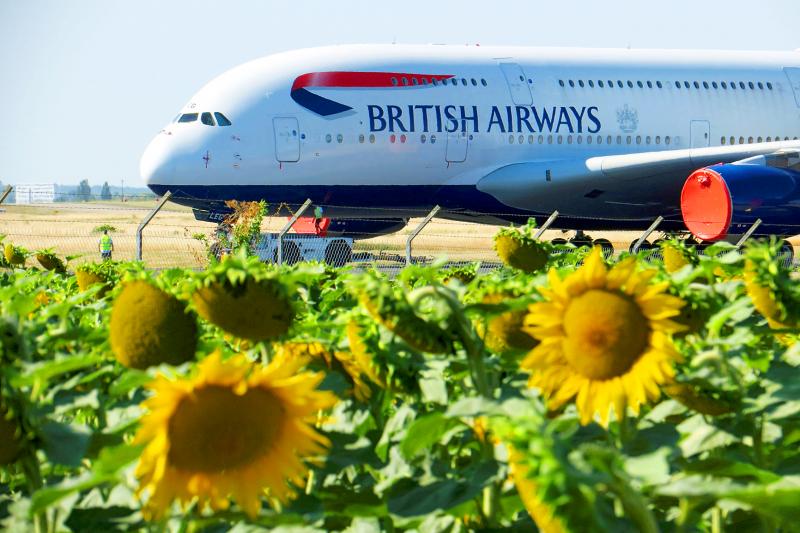Airbus SE is confident its global supplier base can overcome pressures induced by the COVID-19 pandemic and boost output for the company’s workhorse A320 aircraft family, despite the “unprecedented” labor and materials strains complicating that effort, CEO Guillaume Faury said.
Faury reaffirmed the company’s plan to boost A320 output from 40 per month currently to 64 a month in 2023, and said Airbus remains interested in reaching 75 per month around mid-decade.
It is essential the planemaker’s vast supply chain have those ambitious, longer-term targets in mind as it manages through the current turmoil, he said.

Photo: Reuters
“We’re in an unprecedented situation in terms of tension in the supply chain, and we need to start the ramp up,” Faury said.
Airbus suppliers have been hit by raw material shortages, surging logistics costs and labor deficiencies. The challenges are broad, versus the critical shortage of semiconductors that has idled automobile assembly lines from Detroit to Tokyo, for example, Faury said.
Airbus has sent teams to supplier locations to help sort out problems, among other steps to address the issues, he said.
“We think they’ll manage to get on top of it, but it will take time because we’re just restarting from a very low level of activity,” he said. “But it needs to go fast for the A320 family, which is the biggest driver for us.”
Airbus is currently assessing the business case of going beyond 64 A320 jets per month and potentially reaching as many as 75 a month by mid-decade, and that internal study is slated to conclude next year, Faury said.
“We’re just at the beginning of a journey from 40 to 64,” he said. “In 2022, we’ll need to have a good understanding of what we want to do in 2025 or 2026.”
Separately, jet-leasing firm Avolon Holdings Ltd plans to work with Israel Aerospace Industries Ltd (IAI) to convert 30 Airbus wide-bodies for use as freighters, targeting an area in which demand has soared during the pandemic.
The A330-300 passenger jets are to be converted between 2025 and 2028, the company said in a statement yesterday.
It is the first Airbus project for IAI, which has long converted Boeing Co jets, the dominant player in the freighter market.
Air freight has been a rare bright spot for global aviation, as online purchases soar and shipping rates rise. That has fed higher demand for dedicated freighters, which has only intensified with recent global supply chain snarls.
Air cargo revenue is expected to reach US$150 billion this year, with traffic doubling over the next 20 years, Avolon said.

To many, Tatu City on the outskirts of Nairobi looks like a success. The first city entirely built by a private company to be operational in east Africa, with about 25,000 people living and working there, it accounts for about two-thirds of all foreign investment in Kenya. Its low-tax status has attracted more than 100 businesses including Heineken, coffee brand Dormans, and the biggest call-center and cold-chain transport firms in the region. However, to some local politicians, Tatu City has looked more like a target for extortion. A parade of governors have demanded land worth millions of dollars in exchange

Hong Kong authorities ramped up sales of the local dollar as the greenback’s slide threatened the foreign-exchange peg. The Hong Kong Monetary Authority (HKMA) sold a record HK$60.5 billion (US$7.8 billion) of the city’s currency, according to an alert sent on its Bloomberg page yesterday in Asia, after it tested the upper end of its trading band. That added to the HK$56.1 billion of sales versus the greenback since Friday. The rapid intervention signals efforts from the city’s authorities to limit the local currency’s moves within its HK$7.75 to HK$7.85 per US dollar trading band. Heavy sales of the local dollar by

Taiwan Semiconductor Manufacturing Co’s (TSMC, 台積電) revenue jumped 48 percent last month, underscoring how electronics firms scrambled to acquire essential components before global tariffs took effect. The main chipmaker for Apple Inc and Nvidia Corp reported monthly sales of NT$349.6 billion (US$11.6 billion). That compares with the average analysts’ estimate for a 38 percent rise in second-quarter revenue. US President Donald Trump’s trade war is prompting economists to retool GDP forecasts worldwide, casting doubt over the outlook for everything from iPhone demand to computing and datacenter construction. However, TSMC — a barometer for global tech spending given its central role in the

The Financial Supervisory Commission (FSC) yesterday met with some of the nation’s largest insurance companies as a skyrocketing New Taiwan dollar piles pressure on their hundreds of billions of dollars in US bond investments. The commission has asked some life insurance firms, among the biggest Asian holders of US debt, to discuss how the rapidly strengthening NT dollar has impacted their operations, people familiar with the matter said. The meeting took place as the NT dollar jumped as much as 5 percent yesterday, its biggest intraday gain in more than three decades. The local currency surged as exporters rushed to